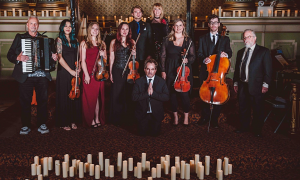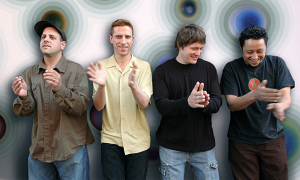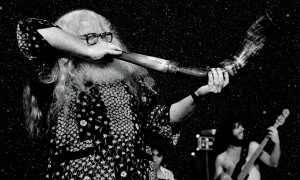Home » Jazz Articles » From the Inside Out » From Britain to Boogaloo
From Britain to Boogaloo
 Chris Barber
Chris BarberMemories of My Trip
Proper American Records
2011
You will find very few jazz retrospectives more thoroughly, warmly inviting than Memories of My Trip, which celebrates six decades of recording and performing by one of Britain's most enduring traditional jazz musicians—trombonist, bassist and bandleader Chris Barber. Presented across two CDs (one subtitled Blues, Jazz & Gospel and the other subtitled Blues & Jazz), Barber's precious Memories are highlighted by admirers such as Muddy Waters, Keith Emerson, Eric Clapton, Van Morrison and others from outside the traditional jazz realm.
Folk-blues legends Sonny Terry and Brownie McGhee climb onboard the blues classic "When Things Go Wrong" with British vocalist Ottile Patterson and give it a long slow ride back through music history to that point where blues and jazz merge on the horizon. "Kansas City" captures a rolling and tumbling snapshot of roughly-hewn blues from one of Muddy Waters' greatest bands (featuring pianist Pinetop Perkins), with Barber's trombone solo growling below Bob Margolin's electric blues guitar. Barber's trombone also helps moan and cry the blues shuffle "Weeping Willow," which Eric Clapton impeccably renders on vocals and slide guitar. Disc one also features guitarists Alexis Corner, who blows through James Cotton's howling, cavernous "Love Me or Leave Me," and a rare live Rory Gallagher's recording of "Can't Be Satisfied" released by permission of Gallagher's estate. This first CD closes with a Van Morrison trilogy that features him thoroughly at home, on vocals and harmonica, in the medium he haunts best—the blues—concluding with the glorious and rollicking "Oh, Didn't He Ramble" from sessions that Barber and Morrison recorded with New Orleans pianist Dr. John for Morrison's landmark A Period of Transition (Warner Bros., 1977).
On the second disc, progressive rock greybeard Keith Emerson lets his funky small combo roots show through Jack McDuff's compact, crunchy instrumental "Rock Candy." Jools Holland rips off "Winin' Boy Blues" like a weathered bluesman surrounded by the joyous Dixieland sound of jazz-blues syncopation, with which he strolls more casually "On the Sunny Side of the Street." "Jack Teagarden Blues" captures a small club date where Barber exchanges trombone blues with Count Basie guitarist, arranger and trombonist Eddie Durham.
Three tunes with guitarist Mark Knopfler help Barber bring the curtain down. Thanks to Vic Pitts' loping bass line and Barber's harmony vocal, "Blues Stay Away From Me" introduces another jazz flavor—country-swing jazz—into Barber's hearty roots stew. After ripping up the "Dallas Rag" (first recorded by Dallas String Band band in the 1920s), Barber and Knopfler and friends bid ya'all a good night " 'Till the Next Time I'm in Town," a perfectly relaxed yet swinging way to close—until next time—Barber's Memories of My Trip.
 Alice Coltrane
Alice ColtraneHuntington Ashram Monastery / World Galaxy
Impulse! Records / Universal Music
2011
Composer, pianist, keyboard player, harpist and bandleader Alice (McLeod) Coltrane married John Coltrane in 1965. She played in her husband's band until his passing in 1967 but his influence remained strong throughout her music thereafter. Few of her albums reflect this influence more strongly than Huntington Ashram Monastery, recorded in 1969, and World Galaxy, recorded in 1971, here combined as part of the Impulse!/Universal 2-on-1 Impulse! reissue series.
Huntington captures a trio date with bassist Ron Carter and drummer Rashied Ali, who picked up for Elvin Jones in John Coltrane's band and helped propel 'Trane into his most "free" jazz. Its title track, originally composed as a solo harp piece, and "Parmahansa Lake" pivot their internal (meditative) and external (exploratory) faces upon the fulcrum of Carter's repetitive, throbbing bass, even though their swirling movements and rhythms, especially from Coltrane's harp, sound static, nearly floating. "I am especially pleased with Ron Carter's playing on this album," she wrote in Monastery's original notes. "His ears are harmonically attuned to higher chord progressions."
Coltrane moves from harp to piano for "Via Sivanandager" and "Jaya Jaya Rama" and the piano's less heavenly, more temporal sound seems to root them in more earthly styles. The spiritual overtones, and multiplicity and sheer volume of her notes, impart such majestic jazz power to "Via Sivanandager" that the comparison to McCoy Tyner, another of her husband's most famous sidemen, seems almost too evident. Her piano roots "Jaya Jaya Rama" in the blood, sweat and tears of the blues.
The meditative sound cloud World Galaxy sounds like music more meant for hearing than listening, which makes its eventual #12 peak in 1972's jazz charts seem even more curious. You've got to admire the vision—and perhaps even the courage—behind her sprawling reorganization of "My Favorite Things," one of her late husband's most famous favorites: Coltrane's electric keyboard picks up the melody for the first few measures, then begins to toy with it like Sun Ra and soon launches the melody into improvisatory overdrive, all wrapped in the first of many pirouetting, brilliant string arrangements.
The prayerful trilogy "Galaxy Around Olodumare," "Galaxy in Turiya" and "Galaxy in Satchidananda" feature these same lush strings surrounding Coltrane's organ, tamboura and harp, which flutters within and around the sound like a winged angel.
"A Love Supreme" transforms her late husband's familiar music into a genuine musical experience—a religious musical experience centered around the sacredness of the word "love" and the nature and name of God which opens with the pronouncement of the word: "Love. Love is a sacred word. Love is the name of God..." The music accompanying Swami Satchidananda's meditation is also led by the epic, dramatic almost cinematic string section and ornamented by Coltrane's rippling celestial harp. She introduces this song's second half by noodling out the chant "A love su-preme" on electric organ, and then explores its outer limits while bassist Reggie Workman and drummer Ben Riley (who injects what we'd call today some hip-hop thump) slowly build a rampaging funk leviathan underneath.
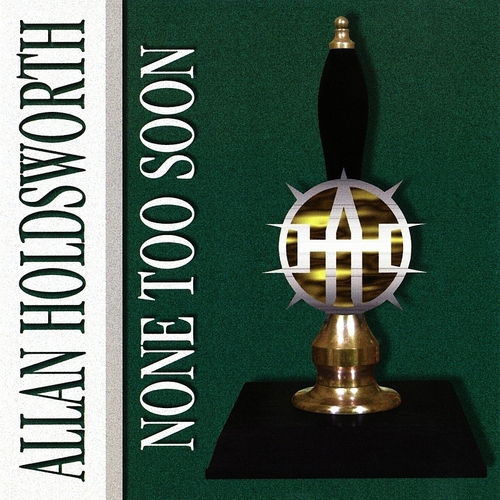 Allan Holdsworth
Allan HoldsworthNone Too Soon
MoonJune Records
2012
For his ninth album, guitar wizard Allan Holdsworth takes on jazz classics by saxophonists John Coltrane and Joe Henderson, pianist Bill Evans and more, plus pop classics just as famous for their jazz interpretations, in a set put together by Holdsworth's longtime musical associate and pianist, Gordon Beck. "Gordon chose most of the tunes, which I hadn't grown up playing and so wasn't that familiar with," Holdsworth recalls. "When he taught me one, it would be just like I was learning a piece of original music."
Holdsworth pops the top off of None Too Soon (recorded in 1996 but remastered to take advantage of 2012's digital technology) with a frantic electric guitar introduction to Coltrane's "Countdown" that screams out "Mahavishnu Orchestra"! After he settles into a more measured approach, the sound of Holdsworth's synthesizer-guitar flows between jazz-rock, jazz and progressive rock in a single voice, like different aspects of the same musical continuum.
Holdsworth and Beck modernize Django Reinhardt's emotive classic "Nuages" with harmonized synth-axe and keyboards which shift and rock upon subtle pulses from the rhythm section of bassist Gary Willis bass and drummer Kirk Covington, cohorts in the jazz-rock fusion institution Tribal Tech. "How Deep Is the Ocean" sounds nothing like the Irving Berlin ballad: Beck uses it as a framework for him and Holdsworth to rock out and jam while bass and drums toss its powerful rhythms back and forth like waves rocking the ocean. Beck's original title suite ("None Too Soon Part One / Interlude / None Too Soon Part Two") is well-considered and articulate in design and execution.
"Norwegian Wood (This Bird Has Flown)" paints an impressionistic watercolor of The Beatles' brooding, timeless classic in soft but bright guitar chords that more than once suggest Pat Metheny in sound and structure; after Beck brilliantly plays the acoustic piano role of Lyle Mays, Holdsworth's electric guitar roars back in and shreds this "Wood" to splinters. Holdsworth's meandering but profoundly emotional sound that opens "Very Early," written by Bill Evans, also suggests Metheny in a ruminative mood, while Beck spreads out a bright, dynamic acoustic piano solo like a blanket through the rest of the tune.
Holdsworth takes a bop-oriented approach to Joe Henderson's "Isotope," twisting and elongating melodic phrases like a sharp John Scofield, and, after another sparkling Beck solo, returns for a closing solo that explodes with the bright yet brittle metallic edge of harder rock guitar.
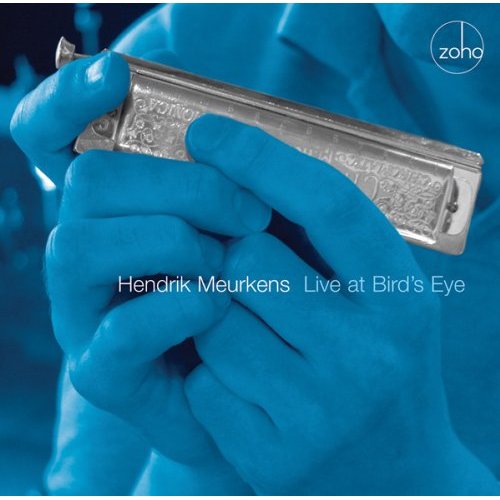 Hendrik Meurkens
Hendrik MeurkensLive at Bird's Eye
ZOHO Music
2011
Live at Bird's Eye embodies the truly global nature of modern jazz: Meurkens' fourth ZOHO release was recorded at two concerts performed at the Bird's Eye Jazz Club in Basel (Switzerland) by his Salsamba Latin Jazz Group, which features this German-born vibes and harmonica player with Russian pianist Misha Tsiganov and the rhythm section of bassist Gustavo Amarante and drummer Adriano Santos, who demonstrate a deep intellectual and emotional familiarity with sambas and other forms from their native Brazil.
Tsiganov's solo acoustic piano introduction to "Dindi" reflects all the charm and beauty of one of Antonio Carlos Jobim's most lovely tunes. He steps back to serve as accompanist for Meurkens' harmonica, which makes the melody sound even lovelier—a little sad, a little happy, a little bright and a little blue. The Quartet's elegant dance with "Voce Vai Ver," another Jobim gem, closes this set.
Quite often, the crystalline sound and feel of Meurkens' vibes surrounded by the Quartet's supple but deceptively powerful Brazilian rhythms create magical musical alchemy. Their sound on the timeless "Body and Soul" suggests the ice cold bluesy funk of Milt Jackson, especially when he begins to swirl the familiar melody into ripples of blue sound that Tsiganov's shimmering accompaniment delicately reflects. His vibes pour out of Sergio Mendes' "Noa Noa" like a musical waterfall that just won't stop flowing, and Tsiganov's piano does too, while Amarante and Santos churn the rhythm into foam and froth.
But even among such famous tunes by Jobim, Mendes, Joao Dinato and Joao Gilberto ("Minha Saudade"), Meurkens' original "Sambatroplis" delivers the highlight of this set. In "Sambatropolis," Amarante and Santos fuse classical and contemporary Brazil in lively polyrhythms, Tsiganov grafts in Russian fire and passion, and the leader's vibes dance on top with a ringing sound as warm and happy as a joyous Snoopy frolicking atop Schroeder's piano in a Peanuts comic strip.
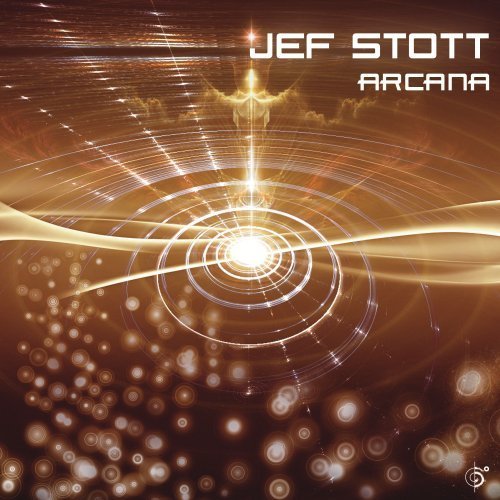 Jef Stott
Jef StottArcana
Six Degrees Records
2012
Arkana is the tenth release by multi-instrumentalist and ethno-conceptualist Jef Stott, one of several artists forging new music through the merger of modern technology and electronic music with indigenous and historical music from around the world—in Stott's case, India and the surrounding region. And the world came very close to never hearing it: Thieves broke into and robbed Stott's apartment and all his computer equipment—including the hard drive with the finished Arkana—was stolen. "I just went back into the studio and made this album," he now recalls. "It's about reclaiming my place in the world, and bringing really powerful female energy back into my life."
Stott wrote or co-wrote every piece and simmers each one for a long and slow boil, which gives each groove plenty of time to steep into your muscle and mental memory. The opening "Deep Playa" (with vocalist Sonja Drakulich providing the "female energy") and subsequent "The Promise" illustrate two sides of the same coin with chattering electronic beats and rhythms that bridge the ancient and modern aspects of Stott's musical vision.
Co-composed with and featuring the vocals of Sophie Mae Lin, "Pulling of the Tide" sounds like a murky dream and casts a somber spell that should prove quite popular with the "tween Twilight" crowd.
"Le Club Lebanon" dances to a far more edgy drum beat. Stott mixes up a tense electronic groove that crackles with all the nervous energy of a disco under siege in a Middle Eastern war zone. The meaning of the words in MC Rai's incantation is less important than their itchy and intense sound, an intensity matched by string passages that divebomb in and out of the atmospheric mix (Stott has "explained" this tune as "Rachid Taha meets The Clash meets electro"). Stott rocks the "Gwana Jam" beat even harder and bounces the bass with considerably more rubber in its funk.
"I wanted to have a narrative, but also deliver on another level," Stott concludes. "The album is meant to be an imaginary soundtrack to an epic adventure film set far in the distant future. Behind it all is a really strong athletic female goddess with a huge sword in her hand. She's a warrior of light. She's always strong and compassionate, but she knows how to use her sword."
 Various Artists
Various ArtistsLong Live Boogaloo: Rare Latin Boogaloos from Spanish Harlem 1963-'72
Secret Stash Records
2012
Long Live Boogaloo captures rare and sometimes underground Latin boogaloo, traditional Cuban music shot up like steroids with James Brown and other hard-driving R&B sounds, which emerged from Spanish Harlem in the 1960s, compiled by producer Bobby Marin for Secret Stash.
Even if this Boogaloo can sometimes sounds anachronistic, it still sounds vibrant and alive. Ten pounds of dynamite stuffed into little more than three minutes, the hard-rocking drums in Ozzie Torrens' "Mia's Boogaloo" beat with the absolute heart of Latin boogaloo, and animate the vibes and a scorching trumpet soloist. "Funky Big Feet" by Bobby Valentin (a Latin funk legend as a solo artist and from stays with Tito Rodriguez, Ray Barretto and other legends of the genre) slips so tightly into its Latin groove that it seems impossible to resist. "Funky Shing a Ling" by guitarist-vocalist King Nando captures one of the surprisingly few attempts to graft into Latin boogaloo the electric guitar sound that was leading the 1960s rock 'n' roll charge.
"Take A Trip" by The Latin Blues Band featuring Luis Aviles rotates around a wobbly tale of copping weed and getting high in Central Park ("As long as I've got my grass / I always have myself a blast!") and thumps from the drummer's seat by renown jazz-funk boogaloo master Bernard Purdie.
Long Live Boogaloo is not entirely obscure: Willie Bobo's rollicking "Be's That Way" revisits the juicy sweets of "Watermelon Man" by Mongo Santamaria. "Boogaloo Sabroso" presents the debut of Santamaria's son Monguito Santamaria with an extended Latin bonfire stoked by thick vocal-percussion jabbering. Clattering percussion and timbales pump muscle into the rhythm of "Pete's Boogaloo," a hit for Pete Rodriguez that pre-dates his more famous "I Like It Like That." "Pretty Mama," another hurricane of percussion, piano, trumpet and rhythm, is rocked to sleep by Ray Barretto, perhaps the most recorded conguero in history, and brings the curtain down.
Long Live Boogaloo is one of the most unexpectedly best party records you'll ever hear. Purists will note that not every tune on Long Live Boogaloo is actually a boogaloo. The rest of us will be too busy shaking our shing-a-lings to care.
Tracks and Personnel:
Memories of My Trip
Tracks: CD1: Memories of My Trip; When Things Go Wrong; Do Lord Do Remember Me; Weeping Willow; Kansas City; Love Me or Leave Me; Can't Be Satisfied; Diggin' My Potatoes; Goin' Up the River; How Long Blues; Goin' Home; Oh Didn't He Ramble; Lonesome Road; I'll Be Rested; Precious Lord, Take My Hand; Couldn't Keep It To Myself; Another Sad One; CD2: St. Louis Blues/Missouri Special/St. Louis Blues; High Society; Rock Candy; Georgia on MyMind; Rose Room; C-Jam Blues; Tea Party Blues; Jack Teagarden Blues; Tailgate Boogie; Winin' Boy Blues; On the Sunny Side of the Street; Blues Stay Away from Me; Dallas Rag; 'Til the Next Time I'm in Town.
Personnel: Chris Barber: trombone, vocals, bass; Brownie McGhee: vocal, guitar; Sonny Terry: vocals, harmonica; Ottile Patterson: vocal; Paul Halcox: trumpet, vocal; Monty Sunshine: clarinet; Eddie Smith: banjo; Dick Smith: bass; Graham Burbridge: drums; Eric Clapton: guitar, vocal; Chris Stainton: keyboards; Dave Bronze: bass; Henry Spinetti: drums; Muddy Waters: guitar, vocal; Pinetop Perkins: piano; Bob Margolin: guitar; Calvin Jones: bass; Willie "Big Eye" Smith: drums; James Cotton: vocal, harmonica; Alexis Korner: guitar; Keith Scott: piano; Rory Gallagher: guitar, vocal; Lonnie Donagan: vocal; John Crocker: clarinet, tenor sax; Ian Wheeler: clarinet, harmonica; Johnny McCallum: guitar, banjo; John Slaughter: guitar, vocal; Vic Pitt: bass; Norman Emberson: drums; Jeff Healey: trumpet, guitar, vocal; Christopher Plock: clarinet, soprano sax, alto sax; Jesse Barksdale: guitar; Brian Graville: piano; Colin Bray: bass; Gary Scriven: drums; Van Morrison: vocal, harmonica, guitar; Paul Sealey: banjo; Colin Miller: drums; John Crocker: tenor sax, vocal; John Deffeary: clarinet, tenor sax; Dr. John: piano; Marlow Henderson: guitar; Reggie McBride: bass; Ollie Brown: drums; Paul Jones: vocal, harmonica; Alan "Sticky" Wickett: drums; Andy Fairweather Low: vocal, guitar; Andy Kuc: banjo; John Sutton: drums; Professor Alex Bradford: vocal; Jackie Flavelle: bass; Edmond Hall: clarinet; Keith Emerson: organ; David Langston: guitar; Lee Jackson: bass; Alan Turner: drums; Trummy Young: trombone, vocal; Sammy Rimington: alto sax; Roger Hill: guitar; Pete York: drums; Joe Darensbourg: clarinet; Richard Simmons: piano; Terry Knight: bass; Dave Evans: drums; Albert Nicholas: clarinet; Jonny Boston: tenor sax; James Evans: clarinet; Anton Fenech: guitar; Gary Simons: bass; John Whitfield: drums; Eddie Durham: trombone; Norman Emberson: drums; Sammy Price: piano; Keith Smith: trumpet; Sandy Brown: clarinet; Ruan O'Lochlainn: guitar; John Rodber: bass; Johnny Armitage: drums; Jools Holland: piano, vocals; Mike Henry: trumpet; David Horniblow: clarinet, tenor sax; Joe Farler: guitar; Mark Knopfler: guitar, vocal.
Huntington Ashram Monastery / World Galaxy
Tracks: Huntington Ashram Monastery: Huntington Ashram Monastery; Turiya; Parmahansa Lake; Via Sivanandager; IHS; Jaya Jaya Rama; World Galaxy: My Favorite Things; Galaxy Around Olodumare; Galaxy in Turiya; Galaxy in Satchidananda; A Love Supreme
Personnel: Huntington Ashram Monestery: Alice Coltrane: harp, piano; Ron Carter: bass; Rashied Ali: drums; World Galaxy: Alice Coltrane: piano, organ, harp, tamboura, percussion; Frank Lowe: saxophones, percussion; Reggie Workman: bass; Ben Riley: drums; Swami Satchidananda: voice; Leroy Jenkins: solo violin.
None Too Soon
Tracks: Countdown; Nuages; How Deep is the Ocean; Isotope; None Too Soon Part One / Interlude / None Too Soon Part Two; Norwegian Wood; Very Early; San Marcos; Inner Urge.
Personnel: Allan Holdsworth: guitar and synthaxe; Gordon Beck: digital piano, keyboards; Gary Willis: bass guitar; Kirk Covington: drums.
Live at Bird's Eye
Tracks: Amazonas; Estate; Sambatropolis; Dindi; Lingua de Mosquito; Noa Noa; Body and Soul; Minha Saudade; Voce Vai Ver
Personnel: Hendrik Meurkens: harmonica, vibraphone; Misha Tsiganov: piano; Gustavo Amarante: bass; Adriano Santos: drums, pandeiro.
Arcana
Tracks: Deep Playa; The Promise; Le Club Lebanon; Semma; Desert Dub (Jef Stott Nomadica Remix); Hero's Return; Pulling of the Tide; Gwana Jam; Sayat Nova (Sendai Tsunami Dub); White Tara (Anusara Mix).
Personnel: Jef Stott: electric bass, bendir, daff, darbouka, acoustic and electric guitars, hammer dulcimer, keyboards, oud; Reda Darwish: darbouka; Sophie Mae Lin: vocals; MC Rai: vocals; Jason McKenzie: table; Diana Rowan: harp; Eliyahu Sills: bansuri, ney flute; Scott Sterling: riqq; Fasial Zedan: darbouka; Sonja Drakulich: vocals.
Long Live Boogaloo: Rare Latin Boogaloos from Spanish Harlem 1963-'72
Tracks: Sister Sue (Johnny Rodriguez & Angel Rene); Mia's Boogaloo (Ozzie Torrens); Funky Big Feet (Bobby Valentin); Chicken and Booze (Manny Corchado); The Boogie Man (Louie Ramirez); Take a Trip (The Latin Blues Band Featuring Luis Aviles); We Belong Together (Herbie Oliveri & The Latin Blues Band); Bataoloa Boogaloo (Bobby Quesada & His Band); Pete's Boogaloo (Pete Rodriguez); Funky Shing a Ling (King Nando); Dance the Boogaloo (Johnny Zamot); Lucy's Spanish Harlem (Louie Ramirez); Keep the Faith (Bobby Valentin); Be's That Way (Willie Bobo); Boogaloo Baby (Johnny Zamot); Ritmo Moderno (Bobby Quesada & His Band); Cookin' with A&J (Johnny Rodriguez & Angel Rene); Straw Boss (Lenni Sesar); Marilu (George Guzman); Boogaloo Sabroso (Monguito Santamaria); Lost in the Jungle (La Cucaracha Brass); Pretty Mama (Ray Barretto).
Personnel: Johnny Rodriguez & Angel Rene; Ozzie Torrens; Bobby Valentin; Manny Corchado; Louie Ramirez; The Latin Blues Band Featuring Luis Aviles; Herbie Oliveri & The Latin Blues Band; Bobby Quesada & His Band; Pete Rodriguez; King Nando; Johnny Zamot; Willie Bobo; Lenni Sesar; George Guzman; Monguito Santamaria; La Cucaracha Brass; Ray Barretto.
< Previous
Jetsetter Jazz
Next >
Casting For Gravity
Comments
Tags
From the Inside Out
Chris M. Slawecki
United States
Muddy Waters
Eric Clapton
Van Morrison
Sonny Terry
Brownie McGhee
Pinetop Perkins
Bob Margolin
James Cotton
Rory Gallagher
Dr. John
Jack McDuff
Jools Holland
Jack Teagarden
Count Basie
Eddie Durham
The Dallas String
John Coltrane
Ron Carter
Rashied Ali
Elvin Jones
McCoy Tyner
Sun Ra
Reggie Workman
Ben Riley
Joe Henderson
Bill Evans
Gordon Beck
Mahavishnu Orchestra
Django Reinhardt
Gary Willis
Tribal Tech
The Beatles
pat metheny
Lyle Mays
John Scofield
Samba Jazz Quartet
Misha Tsiganov
Gustavo Amarante
Adriano Santos
Antonio Carlos Jobim
Milt Jackson
Sergio Mendes
Joao Gilberto
MC Rai
Rachid Taha
James Brown
Tito Rodriguez
Ray Barretto
Bernard Purdie
Willie Bobo
Mongo Santamaria
Pete Rodriguez
For the Love of Jazz
 All About Jazz has been a pillar of jazz since 1995, championing it as an art form and, more importantly, supporting the musicians who create it. Our enduring commitment has made "AAJ" one of the most culturally important websites of its kind, read by hundreds of thousands of fans, musicians and industry figures every month.
All About Jazz has been a pillar of jazz since 1995, championing it as an art form and, more importantly, supporting the musicians who create it. Our enduring commitment has made "AAJ" one of the most culturally important websites of its kind, read by hundreds of thousands of fans, musicians and industry figures every month.






